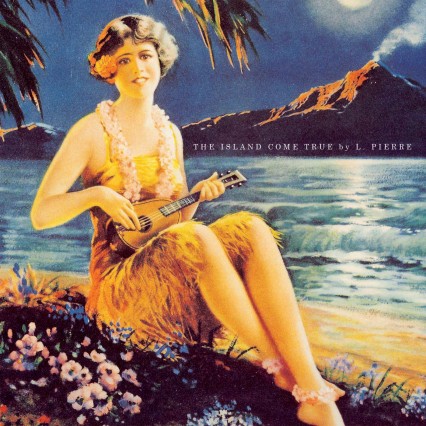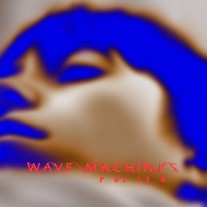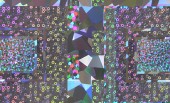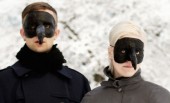There were two reasons why we were reluctant to pick this as Album of the Week. Firstly, there’s a wealth of competitors for this week’s finest release, with albums from The Revival Hour, On An On, Widowspeak, Ducktails, Speck Mountain, The Holydrug Couple and more all clogging up the musical drains (hmmm, probably should’ve chosen a metaphor that didn’t suggest they’re all giant turds. They’re not, honest). Secondly, it’s already been reviewed in a uniquely personal manner by John Doran at The Quietus, which is kind of hard to top. However, “The Island Come True” is undoubtedly the best album released this week, maybe this year, and so to not recognise it as such would make a mockery of the whole institution. A mockery, you hear! So here goes.
L. Pierre, née Lucky Pierre (named after a vintage smut flick), is the electronic, sample-based alter-ego of former Arab Strap (named after an old erection aid) vocalist Aidan Moffat. In that band he was known for his astonishing lyricism, which could move from puerile obscenity to moving poignancy with a very Scottish swiftness – see the opening line of Arab Strap’s ‘Packs of Three’ for the former and ‘The First Big Weekend of the Summer’ for the latter (a track which, on the surface, is just about staying up and getting wasted in the sunshine – so why are your “eyes a bit damp” by the end?).
It was therefore surprising when his solo project turned out to be a completely instrumental affair. “Hypnogogia” featured lush orchestral samples alongside simple beats to produce something worlds away from the Falkirk boozers and doss houses of Arab Strap. So much so that it was years before I actually realised Moffat was behind it – when James Holden selected opening track ‘Angels on Your Body’ for his At The Controls mix I assumed L. Pierre was just some French bloke he’d snared for his Border Community stable. Moffat described the record as his “own personal comedown mix”, inspired by “10p charity shop records… I loved taking these unwanted and fairly atrocious records and making something darker and hopefully prettier out of them.”
Two more albums followed along similarly blissful lines, with Moffat indicating that 2007’s dronier “Dip” was the last L. Pierre project he’d be releasing. Then he discovered some old samples while absent-mindedly rooting through old boxes of CDs, and “The Island Come True” was born.
As an album it sounds, in the best possible way, like a rescued 10p charity shop version of his earlier work. At times it feels like a voyage into the memory wastes of dementia; like “Dip” it opens with recordings of gulls, making you feel like you’re in a familiar place but with no recollection of how you got there. Even the album’s cover seems like it should be propped up against the wall of a cluttered Mind shop, only likely to sell to a kitsch-crazed spendthrift (or someone who just wants the frame).
Whenever you think you’ve located yourself on this album, you’re taken elsewhere. ‘Harmonic Avenger’ opens with the most dramatic moment on an L. Pierre LP yet (not difficult admittedly), with a pianist thundering down a phrase from Rachmaninov’s ‘Prelude in C Sharp Minor’ in a way that makes you expect a long-cloaked villain to emerge from out of the shadows. It soon calms down however, and develops into something quite beautiful, with strings slowly dancing between the gaps in the piano and a ghostly accordion drifting through the mist. Maybe it’s the influence of Doran’s review, but it seems to communicate the maudlin blurriness of being desperately sad but having reached the point of drunkeness where you can’t quite remember why.
The feelings conjured by this record are frequently ambiguous, and never more plainly than on the heavenly but mournful ‘Sad Laugh’. Strings and guitar descend in a way that initially appears to be sorrowful, but by slinging in the occasional major chord Moffat manages to avoid appearing like he’s simply aiming for a cheap emotional hit. That the track ends with a sample of a child crying in a way that sounds like laughter, or vice versa, is perfect.
The other stand out tracks are ‘Dr Alucard’, notable for employing a percussive element that’s been washed off elsewhere, and ‘The Grief That Does Not Speak’, which puts you in mind of an elderly, dying Italian man who’s succumbed to the final onslaught of senility, the music all that remains in his disintegrating brain. Well, that’s where it puts me anyway. Who knows where it’ll put you.
Elsewhere the album is awash with Hauntological samples: ice cream vans, fractured, layered radio adverts, Calpol-tinged gibberish and, on ‘Drums’, the kind of scattershot, abstract track that Broadcast used to put on their albums to stop you from getting too comfortable. The overall effect is entrancing and affecting where previous L. Pierre albums were simply lush and pretty. Yes they had an emotional impact too, but they never seemed to reach quite as deeply. With “The Island Come True”, it feels like Moffat’s L. Pierre alter ego has finally come true too.






Follow us
Follow us on Facebook Follow us on Twitter Follow us on Google+ Subscribe our newsletter Add us to your feeds